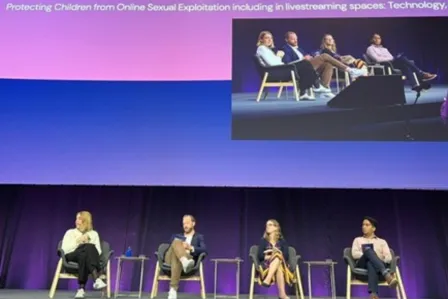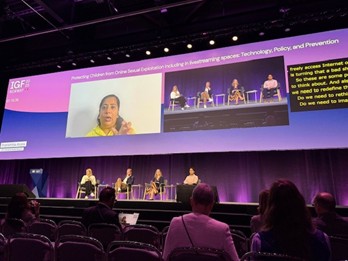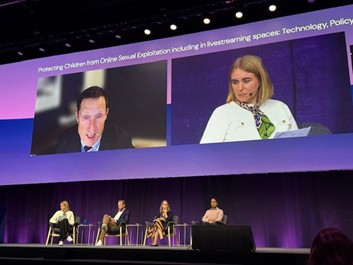The digital landscape is a vibrant space for children and young people, but it also presents unique and evolving challenges for child safety, particularly concerning online child sexual abuse material (CSAM). From real-time abuse occurring during livestreams to the increasing prevalence of self-generated content and online coercion, the nature of CSAM is rapidly transforming. To address these urgent issues, on Wednesday, 25 June 2025, the Insafe delegation co-hosted together with the Centre for Democracy & Technology a workshop session at the annual Internet Governance Forum (IGF) 2025 in Lillestrøm, Norway.

The session, titled "Protecting children from online sexual exploitation including in livestreaming spaces: technology, policy, and prevention" brought together a diverse group of experts from civil society, industry, and academia to explore how technology, policy, and education can intersect to combat CSAM online. The discussion emphasises a global and culturally inclusive lens, considering how children from specific communities are affected and how to promote equitable protection for all.
A multi-faceted approach to child safety
The 90-minute workshop was structured to foster comprehensive discussion and practical outcomes. The session designed as a hybrid manner, ensured inclusivity with dual moderators, a mix of onsite and online speakers, and integrated live Q&A for all participants.
Key policy questions guided the discussion around:
- How can technologies to prevent CSAM on livestreaming platforms be integrated into trust and safety systems in a way that protects and promotes children's rights? This includes evaluating the effectiveness of these tools for children from specific communities, such as those speaking certain languages or from different cultures.
- How can cross-platform efforts be promoted to prevent the spread of CSAM content, especially when livestreaming is used to drive traffic elsewhere?
- How can national and international policies be strengthened to address emerging forms of abuse, such as self-generated content and online coercion?
- What preventative measures, including education and digital safeguards, can empower children to recognise and respond to child sexual abuse online?

Expert voices and multistakeholder collaboration
The workshop benefited from a distinguished roster of speakers and facilitators, including:
- Awo Aidam Amenyah, Executive Director, Child Online Africa
- Lisa Robinson, Online Safety Policy Analyst at the OECD (Organisation for Economic Co-operation and Development)
- Pratishtha Arora, CEO, Social Media Matters
- Robbert Hoving, President, Offlimits, part of the Dutch Safer Internet Centre
- Sean Litton, President and CEO, Tech Coalition
- Dr. Sabine K. Witting, Professor at Leiden University
- Kate Ruane, Centre for Democracy & Technology

Takeaways
The workshop session offered a deeper understanding of the intersection of livestreaming, digital platforms, and CSAM. Participants acquired practical knowledge of current technologies and their impact on privacy, safety, and children’s rights, alongside insights into emerging trends such as self-generated content and sextortion. The workshop also explored approaches to integrating digital literacy and online safety into national curricula and parenting resources.
A core goal is to provide tools to support collaboration between governments, platforms, educators, and civil society, leading to actionable recommendations to improve platform safeguards, reporting systems, and policy frameworks.
- Knowledge sharing: increased awareness among IGF participants regarding current and emerging online CSAM threats, particularly on livestreaming platforms.
- Policy and practice recommendations: development of practical recommendations for governments, companies, and civil society aimed at preventing online CSAM while upholding children’s rights.
- Community building: facilitation of a global network of practitioners, researchers, and advocates dedicated to tackling CSAM through both technical and preventative measures.
- Continued engagement: launch of potential follow-up initiatives, such as roundtables or working groups, to further refine and implement the recommendations.
By fostering multi-stakeholder collaboration and sharing expertise, the workshop aimed to advance global efforts towards a safer, more resilient digital world where children can thrive. The focus on technology, policy, and prevention, coupled with a rights-respecting approach, offers a promising path forward in protecting the most vulnerable users online.
The workshop recording and transcript are available.
The digital landscape is a vibrant space for children and young people, but it also presents unique and evolving challenges for child safety, particularly concerning online child sexual abuse material (CSAM). From real-time abuse occurring during livestreams to the increasing prevalence of self-generated content and online coercion, the nature of CSAM is rapidly transforming. To address these urgent issues, on Wednesday, 25 June 2025, the Insafe delegation co-hosted together with the Centre for Democracy & Technology a workshop session at the annual Internet Governance Forum (IGF) 2025 in Lillestrøm, Norway.

The session, titled "Protecting children from online sexual exploitation including in livestreaming spaces: technology, policy, and prevention" brought together a diverse group of experts from civil society, industry, and academia to explore how technology, policy, and education can intersect to combat CSAM online. The discussion emphasises a global and culturally inclusive lens, considering how children from specific communities are affected and how to promote equitable protection for all.
A multi-faceted approach to child safety
The 90-minute workshop was structured to foster comprehensive discussion and practical outcomes. The session designed as a hybrid manner, ensured inclusivity with dual moderators, a mix of onsite and online speakers, and integrated live Q&A for all participants.
Key policy questions guided the discussion around:
- How can technologies to prevent CSAM on livestreaming platforms be integrated into trust and safety systems in a way that protects and promotes children's rights? This includes evaluating the effectiveness of these tools for children from specific communities, such as those speaking certain languages or from different cultures.
- How can cross-platform efforts be promoted to prevent the spread of CSAM content, especially when livestreaming is used to drive traffic elsewhere?
- How can national and international policies be strengthened to address emerging forms of abuse, such as self-generated content and online coercion?
- What preventative measures, including education and digital safeguards, can empower children to recognise and respond to child sexual abuse online?

Expert voices and multistakeholder collaboration
The workshop benefited from a distinguished roster of speakers and facilitators, including:
- Awo Aidam Amenyah, Executive Director, Child Online Africa
- Lisa Robinson, Online Safety Policy Analyst at the OECD (Organisation for Economic Co-operation and Development)
- Pratishtha Arora, CEO, Social Media Matters
- Robbert Hoving, President, Offlimits, part of the Dutch Safer Internet Centre
- Sean Litton, President and CEO, Tech Coalition
- Dr. Sabine K. Witting, Professor at Leiden University
- Kate Ruane, Centre for Democracy & Technology

Takeaways
The workshop session offered a deeper understanding of the intersection of livestreaming, digital platforms, and CSAM. Participants acquired practical knowledge of current technologies and their impact on privacy, safety, and children’s rights, alongside insights into emerging trends such as self-generated content and sextortion. The workshop also explored approaches to integrating digital literacy and online safety into national curricula and parenting resources.
A core goal is to provide tools to support collaboration between governments, platforms, educators, and civil society, leading to actionable recommendations to improve platform safeguards, reporting systems, and policy frameworks.
- Knowledge sharing: increased awareness among IGF participants regarding current and emerging online CSAM threats, particularly on livestreaming platforms.
- Policy and practice recommendations: development of practical recommendations for governments, companies, and civil society aimed at preventing online CSAM while upholding children’s rights.
- Community building: facilitation of a global network of practitioners, researchers, and advocates dedicated to tackling CSAM through both technical and preventative measures.
- Continued engagement: launch of potential follow-up initiatives, such as roundtables or working groups, to further refine and implement the recommendations.
By fostering multi-stakeholder collaboration and sharing expertise, the workshop aimed to advance global efforts towards a safer, more resilient digital world where children can thrive. The focus on technology, policy, and prevention, coupled with a rights-respecting approach, offers a promising path forward in protecting the most vulnerable users online.
The workshop recording and transcript are available.
- < Previous article
- Next article >












